With the world weeping in misery and death engulfing all through tremendous torture; humour makes us smile at our own doom. It requires a colossal amount of genius to craft a sensitive matter and transform it into a comedic work. Death, misery, torture, agony and pain aren’t matters to be ridiculed, but some filmmakers artistically create a comical side which makes our rib tickle.
Black comedy or dark comedy is an artistic genre that deals with a subject matter generally considered taboo, sensitive and dark; and comically presents it. Coined by Surrealist theorist André Breton in 1935, critics have found its origins in the celebrated works of Jonathan Swift. Specialising in grotesqueness and twisted recreation, dark comedy usually deals social issues such violence, murder, abuse, domestic violence, rape, torture, war, genocide, terrorism, corruption, discrimination, chauvinism, racism, sexism, homophobia, diseases, anxiety depression, suicide, nightmares, drug abuse, mutilation, disability, terminal illness and insanity, to name a few.
While dark comedy emerged in literature, with Swift’s ‘A Modest Proposal’ (1729) and ‘A Meditation Upon a Broom-Stick’ (1710) being the earliest works, black comedy has been extensively dealt in cinema. Showcased since the 1930s, some of the earliest works such as ‘One Hour with You’ (1932), ‘The Crime of Monsieur Lange’ (1936) and ‘The Devil and Daniel Webster’ (1941) sparked off the genre.
However with films such as ‘Arsenic and Old Lace’ (1944) and ‘Kind Hearts and Coronets’ (1949), black comedy took itself to the mainstream directorial ventures and was essentially transformed into a popular genre. Since then, veteran directors such as Quentin Tarantino, Martin McDonagh, Stanley Kubrick, John and Ethan Coen, and Slobodan Šijan have produced some of the most famous works of this genre and have eternalised it.
Really good black comedy movies are difficult to find. For this list, I have taken in account the darkness of the subject and the magnitude to which these films have been comically conceived. The selection of the films has been on the criteria of the amalgamation of their critical appreciation, commercial venture and cultural impact. Here is the list of top black comedy movies ever. You can also find some of these best black comedy movies on Netflix, Hulu, or Amazon Prime.
15. Kind Hearts and Coronets (1949)
Adapting Roy Horniman’s ‘Israel Rank: The Autobiography of a Criminal’ (1907), this 1949 film chronicles the story of a poor relative of the Duke of D’Ascoyne, Louis D’Ascoyne Mazzini, who plots to inherit the title by murdering the eight other heirs who precede him in the line of succession.
Releasing in London theatres, the film bases its humour against the backdrop of Edwardian England which saw a leaping rise of trade immigration due to the development of industrialism in England. With the rising political awareness among the working class who questioned their morale suppression under industrial owners, director Robert Hamer drew analogous imagery of the polarising morality of the Edwardian Era. Representing the comedic darkness through the protagonist, Mazzini seems like a likable charming young English gentleman who is actually a remorseless, calculating murderer.
The aristocratic tendencies embroiled in the quilted sexuality are innately dealt by the directorial team who use mannerisms, family fortune and appearance as their comedic tool. While initially perceived as a mere satire, film historians and critics since have identified its dark undertones which make it a quintessential dark comedy on Edwardian manners and morals. Alec Guinness’ deft portrayal of the nine members of the D’Ascoyne family was immensely appreciated by critics. The film spearheaded British cinema and won the award for “Best Production Design” at the 10th Venice International Film Festival. The film’s commendable articulation of wit and humour earned it the distinction of being one of the most culturally celebrated works of British cinema.
Read More: Best Fairy Tale Movies of All Time
14. The Marathon Family (1982)
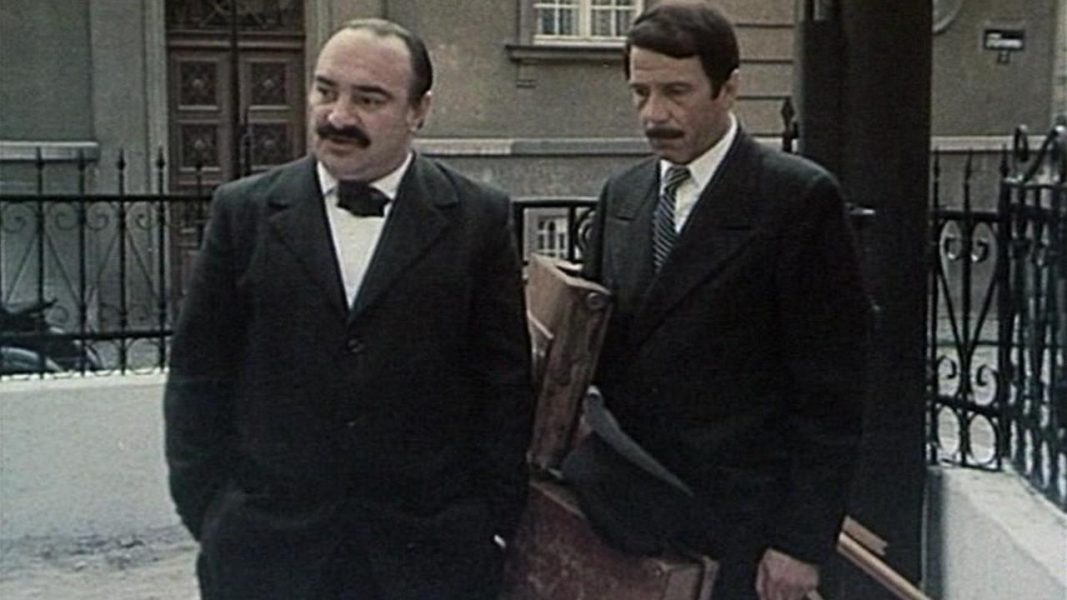
Directed by Slobodan Sijan, the film is swarming with his comedic genius. Adapting the tradition of inheritance, ‘The Marathon Family’ is a story of the Topalovic family, who have been in the burial business for generations. However, when the oldest member, Pantelija dies at the age of 150, the five generations of his heirs combat each other for the inheritance. Written by the ever masterful Dušan Kovačević, the film was an adaption of his own play. This essentially established the foundation of an engaging narrative which spearheads the entire film.
The film has been regarded as one of the classics with the splendid cinematography by Božidar Nikolić being called as an inspiration for generations of filmmakers. The film went on to win the “Jury Prize” at the Montréal World Film Festival and Seka Sablić’s portrayal of Kristina earned her the “Best Actress” award at the Pula Film Festival.
Read More: Best Spider Movies of All Time
13. Heathers (1988)
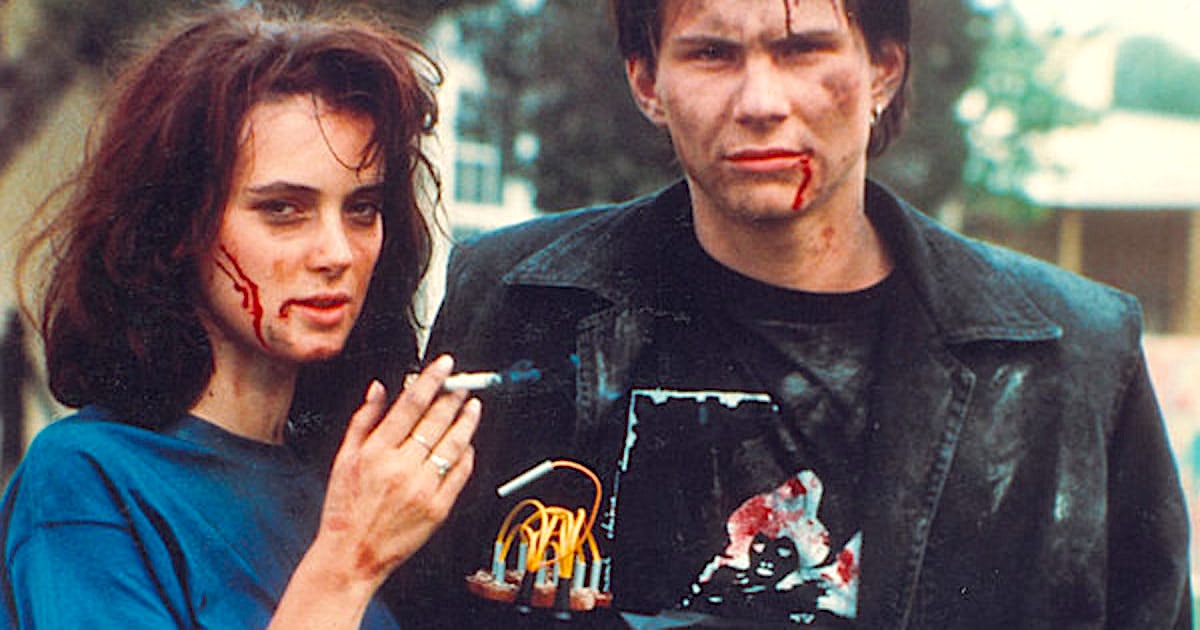
While 1980s saw a rise in teen films where the characters would suddenly break into dances and indulge into engaging love stories; ‘Heathers’ broke stereotype and presented a distorted vision of a quintessential teen flick. Directed by Michael Lehmann, this 1988 film is about Veronica Sawyer, played by Winona Ryder, who in order to get out of the snooty clique that is destroying her good-girl reputation, teams up with a sociopath essayed by Christian Slater to murder her friends under the façade of a suicide.
Establishing a strong foundation on Daniel Waters’ articulate screenplay, the film comments upon the over-the-top dreamy sequences presented in teen flicks. Academic critics have cited the film in cultural contexts, calling it as a remark on the portrayal of American democracy and American culture as an iconic symbol. The director and screenwriter brilliantly collaborated to create something as dark as ‘Heathers’. The film bases itself on the witty contextual references and artistically designed suicide notes. The dark and cynical matter attached to the teen culture was quite off-putting, with actors either unwilling to play the parts or unable to don the characters.
Receiving high critical praise, the film started out as a commercial flop but glacially gained a cult following over the years. Daniel Waters’ writing was immensely appreciated and has since credit to be the strongest weapon of Lehmann’s directorial venture. The film has been mentioned as one of the best high school movies and also earned the 412th spot on Empire’s list of “The 500 Greatest Movies of All Time”.
Read More: Best Ship Movies of All Time
12. Harold and Maude (1971)
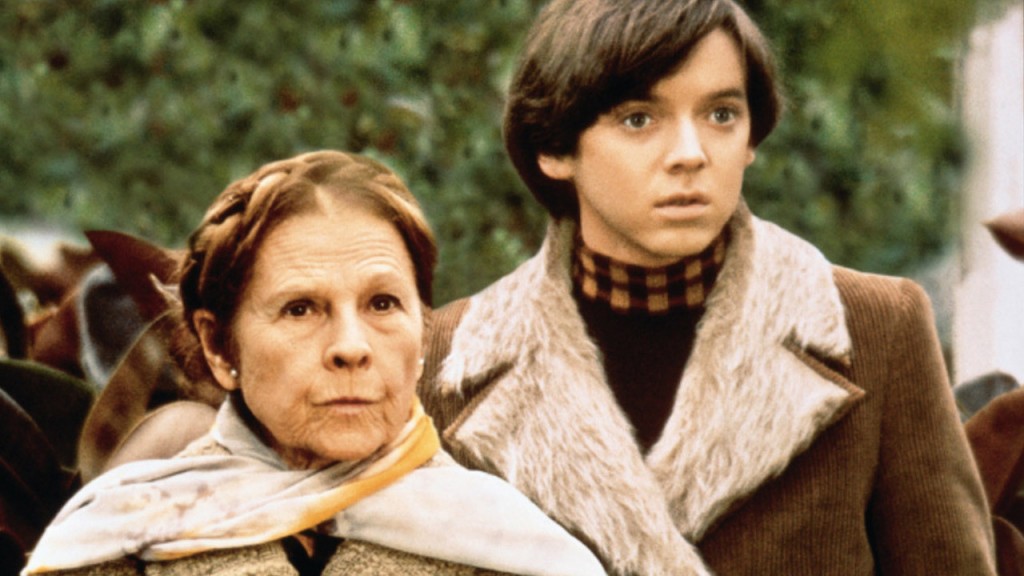
Dark Humour was initially incepted to offend viewers by satirising and comically presenting dark content; and ‘Harold and Maude’ is the perfect archetype of it. Directed by Hal Ashby, this 1971 black comedy is the story of a rich runt Harold, who finds his life change forever when he meets the lively septuagenarian Maude at a funeral. An insanely twisted subject matter, collaborating writer Colin Higgins inventively manipulated death as a tool of humour. Harold, essayed by Bud Cort is obsessed with death; while 79 year-old Maude essayed by Ruth Gordon teaches him the value of life through her own obsession of death. The film brilliantly infuses a romantic drama with distorted comedy and presents the idea of existentialism and demise.
A film ahead of the 70s era of filmmaking was panned by critics and audience for its “immature” perception of death. Adding to its misfortune, noted film critics such as Roger Ebert and Vincent Canby slammed and berated every aspect of the film; calling the characters “off-putting” and criticizing the writing as poor. As a result, ‘Harold and Maude’ was a commercial failure. However, through time, the film gained a cult following with an 86% rating on Rotten Tomatoes. With intrinsic research came greater acclaim. Writers Guild of America ranked the screenplay 86 on its list of “101 Greatest Screenplays ever written”. ‘Harold and Maude’ redeemed the absence of awards and initial praise with several inductions in “top lists”, with American Film Institute recognising them in “100 Years… 100 Laughs”, “100 Years…100 Passions” and “10 Top 10” to name a few.
Read More: Best Danish Movies of All Time
11. American Psycho (2000)
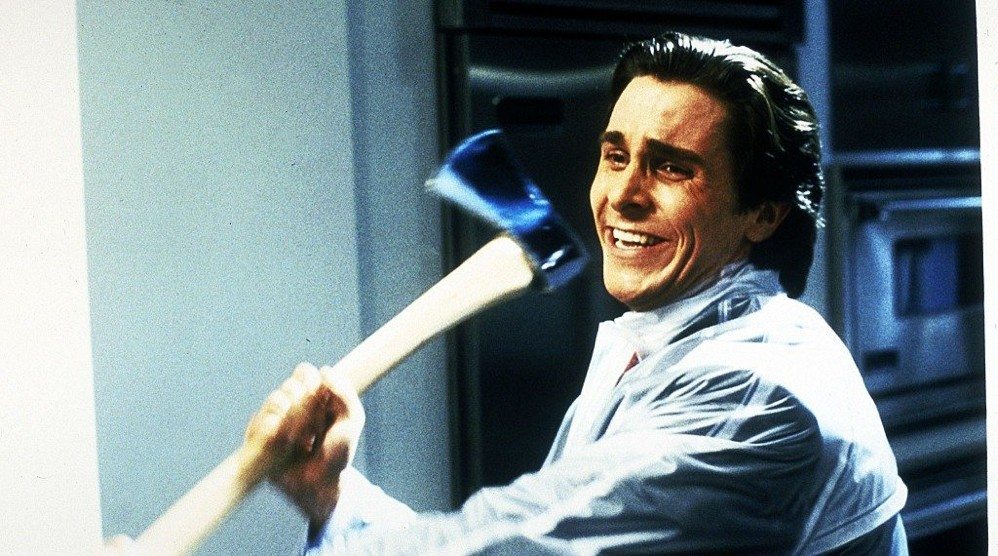
A film often misinterpreted for its eye-boggling violence, sexual themes and disturbing sequences; ‘American Psycho’ employs a variety of allusions, themes and motifs to sketch out the story of Patrick Bateman – a wealthy New York investment banking executive, who has an alternate dark side hidden from all – a side indulging in murder, torture and hedonistic fantasies.
The Bret Easton Ellis novel adapted flick stars Christian Bale, Willem Dafoe and Jared Leto as the primary lead, with several other actors acting as the supporting cast. ‘American Psycho’ unequally bases itself in the horror genre, with its grotesqueness causing a stir among many. Director Mary Harron and writer Guinevere Turner collaborated to iterate the dark comedy through the film’s primary character, Christian Bale’s Patrick Bateman. The film uses the Bateman and his experiences to showcase the director’s ideas. Bateman is a narcissist, who can go to extreme lengths in order to achieve his aim. He displays his talents as a banker by the day, and turns into pleasure-seeking monster by night. The character humours himself with materialism, purchasing the finest cloth and dining in the classiest restaurants. Patrick Bateman takes innate care of his skin, hair and body; applying body products and exercising daily. However, the man is unreliable, who lives off the violent death of other people. He tortures women, sexually assaults them and doesn’t blink an eye before chopping a man’s head off. Bale’s character is a dexterous compulsive liar.
Debuting in the Sundance Film Festival, the film received polarising reviews due to its unabashed violence. However, Bale earned immense accolade for his twisted portrayal, making the role his career’s turning point. Critics praised the adaptation, commenting the film’s maturity in not sensitizing the plot.
Read More: Best Filipino Movies of All Time
10. The Ladykillers (1955)
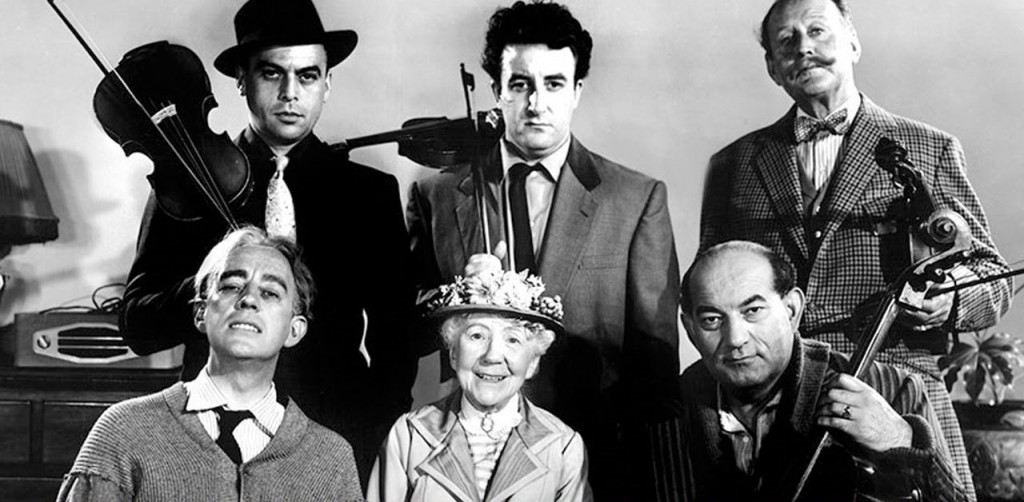
Directed by Alexander Mackendrick, this 1955 black comedy details the story about five diverse criminals who plan a bank robbery, rent rooms from an octogenarian widow under the guise that they are classical musicians.
A classic of British comedy genre, the film does not seem as an intentional comedy, but as a classic heist film which is encapsulated by the comedic intellectually. While Cecil Parker’s as Major Claude Courtney is the definitive sly criminal, Peter Sellers adds to a cultural variety with his cockney Harry Robinson, a callous and goofy criminal. Danny Green’s muscular character ‘One-Round’ Lawson is comedic gold with his sluggish wit and impaired thinking capacity. Herbert Lom’s impatient Louis Harvey layers the plot with his hurried approach and distaste towards the planned heist. Mackendrick’s film bases the humour on the annoying diversity which essentially makes them quite incompetent to successfully pull off a back robbery. The inept group is dexterously moulded by the polar-opposites – Alec Guinness’ Professor Marcus and Katie Johnson’s Mrs Louisa Wilberforce. With Guinness’ creep buck toothed suspiciousness and Johnson’s ginormous politeness; the gong of comedy strikes itself.
Written by William Rose, the movie adeptly employs comedy when the notorious group start lying to Mrs Louisa Wilberforce. The unabashed merciless nature of the miscreants combined with the soulful gullibility of the widow masterfully produces one of the greatest comedic works. With the overlapping plot, the film could’ve easily gone quite messy; but with the excellent writing of Rose and the maturity of the leads, the film has often been called the one of the greatest British films of all time, especially receiving praise from British Film Institute. The triumph of the film won it “BAFTA Award for Best Actress in a Leading Role” earned by Katie Johnson and “BAFTA Award for Best British Screenplay” earned by William Rose.
Read More: Best Country Music Movies of All Time
9. Who’s Singin’ Over There? (1980)

A Yugoslav black-comedy, ‘Who’s Singin’ Over There?’ is the story about a group of passengers, who while traveling by bus to Belgrade in 1941, come across an event which changes their lives forever. Set during the last days of the Kingdom of Yugoslavia, just before the Axis occupation of Yugoslavia, the Slobodan Šijan directed flick is widely considered as one of the best Serbian movies ever made.
This 1980 black comedy brilliantly employs the thematic representation of characters and situations and draws a parallel with it. Featuring an ensemble cast, the film presents character quirks and development to adroitly sketch out a satirical image of the Yugoslavian era of change. Written by Serbian playwright Dušan Kovačević, Who’s Singin’ Over There?’ ridicules and parody’s Nazi Germany, Nazi authoritarian figures and societal change of norms through it’s quite iconic characters.
Screened at the 1981 Cannes Film Festival, the film was unanimously praised by critics and audience. Šijan’s mature direction and Kovačević’s articulate writing has aged like fine wine, becoming one of the most celebrated Serbian successes. Often cited as a culturally dominant force which impacted the society at a humongous scale, the film has gained the distinction of being one of the most quoted and enacted flicks ever made. An instant classic, ‘Who’s Singin’ Over There?’ bagged a “Special Jury Award” at the 1981 Montréal World Film Festival and was voted as the “Best Serbian movie made in the 1947-1995 period” by the Yugoslavian Board of the Academy of Film Art and Science (AFUN).
Read More: Best Roman Movies of All Time
8. Inglourious Basterds (2009)
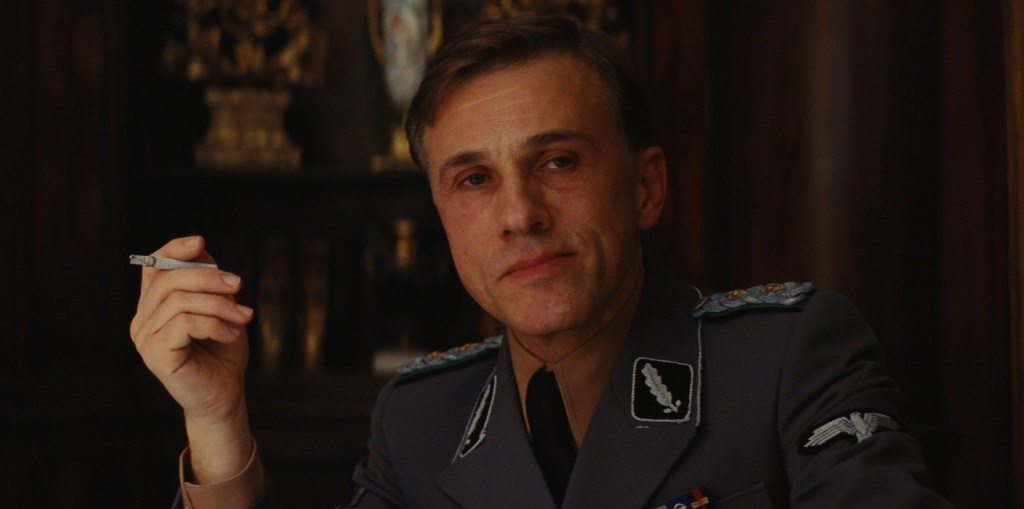
Nazism is no joke. Nazi Germany has been eternalised as one of the darkest realities impacting world history. With German dictator Adolf Hitler and the Nazi Party (NSDAP), Germany was transformed into a totalitarian state and German history witnessed its most grotesque and torturous periods.
However, with Quentin Tarantino, the darkest subject matters are unsettlingly funny and comical; and ‘Inglourious Basterds’ is product of that twisted mind. A black satirical comedy on Nazi Germany, the film employs alternate history to essentially mould the events according to the comedic morality. The director reiterated his commanding grasp on screenplays and successfully created memorable characters with the required amount of comedic timing. Starring Brad Pitt, Christoph Waltz, Michael Fassbender, Eli Roth, Diane Kruger, Daniel Brühl, Til Schweiger and Mélanie Laurent; the film is set in Nazi-occupied France during World War II, where the plan of a group of Jewish U.S. soldiers mystically coincide with a theatre owner’s personal vengeful plans to assassinate Nazi leaders and essentially, Adolf Hitler.
Inspired from Italian director Enzo G. Castellari’s ‘The Inglorious Bastards’ (1978), Tarantino did away with mere portrayal of Nazi mentalities and war, and adds controversial stinging humour. The film comprehensibly divided itself into distinctive sections, elevating the contextual humour. Death, torture and verbal torment are repeated themes which balanced the seriousness and the comedic vision.
The aforementioned writing is the strongest literary armament which reportedly took over a decade for Tarantino to develop, and it paid off glamorously. With masterfully crafted characters and comically written plot, the film went to earn heavy accolades from critics and audience. Christoph Waltz’s performance as the villainous SS Colonel Hans Landa generated waves of applauds and earned him “Best Supporting Actor” at the Academy Award, the “Best Actor in a Supporting Role” at the Austin Film Critics, Boston Film Critics, British Academy Film Awards, Broadcast Film Critics, Cannes Film Festival, Chicago Film Critics, Empire Awards, Golden Globe Awards, Hollywood Film Festival, London Film Critics’ Circle and Los Angeles Film Critics to name a few. Adding to its merits, Independent Film & Television Alliance selected the film as one of the “30 Most Significant Independent Films of the last 30 years”.
Read More: Best Princess Movies of All Time
7. In Bruges (2008)
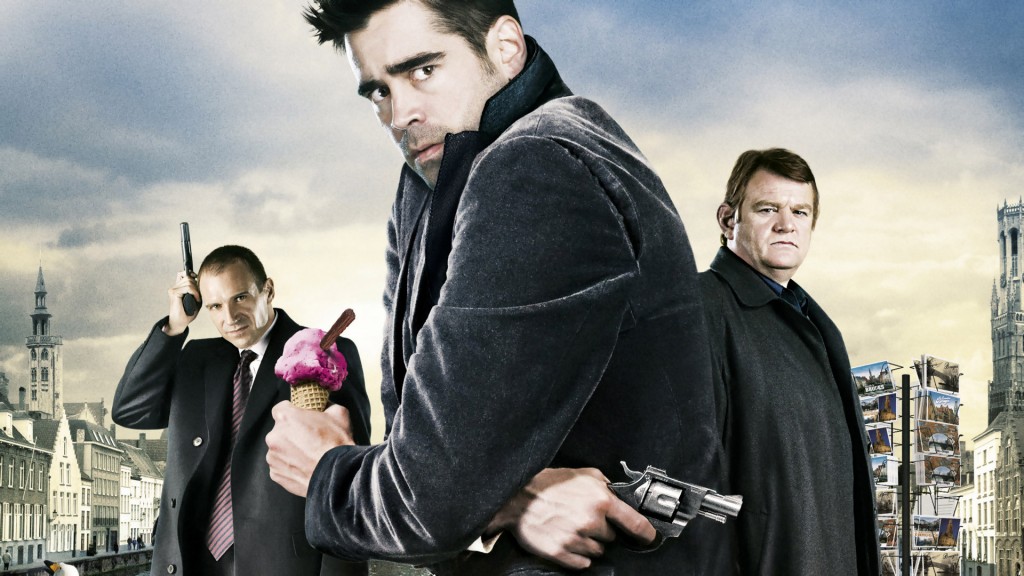
With Martin McDonagh winning the “Best Original Screenplay” at the British Academy Film Awards, nothing could go wrong with ‘In Bruges’. Helmed on by McDonagh, the film follows the story of two Irish hitmen, Ray and Ken Daley essayed by Colin Farrell and Brendan Gleeson, and their maniacal mob boss, Harry Waters played by Ralph Fiennes. Set in the city of Bruges, the film bases its humour with the duo of Farrell and Gleeson. Director McDonagh brilliantly set the British “stiff upper-lip” against the crassness and unruliness of the films characters. Adapting certain references from Harold Pinter’s ‘The Dumb Waiter’ (1957) and Nicolas Roeg film ‘Don’t Look Now’ (1973), the flick is a stinging comment on the society. The writing focuses on its dark analogies, which is marvellously enacted by the crisp dialogues.
Releasing in the 2008 Sundance Film Festival, the film earned immense praise from critics, with all applauding its twisted dark humour. The lead cast was appreciated for their mature take on McDonagh’s ideals; with film critics Roger Ebert, Tasha Robinson and Claudia Puig particularly praising the performances of Farrell and Gleeson. With theatre as a strong foundation to the McDonagh’s directorial techniques, the film portrays the dialogues with dexterity. Among its gallon of awards, McDonagh won quite a many for his screenplay at the British Academy Film Awards, the British Independent Film Awards, the Edgar Awards, the Evening Standard British Film Awards and the Irish Film & Television Awards.
Read More: Best Vikings Movies of All Time
6. Trainspotting (1996)
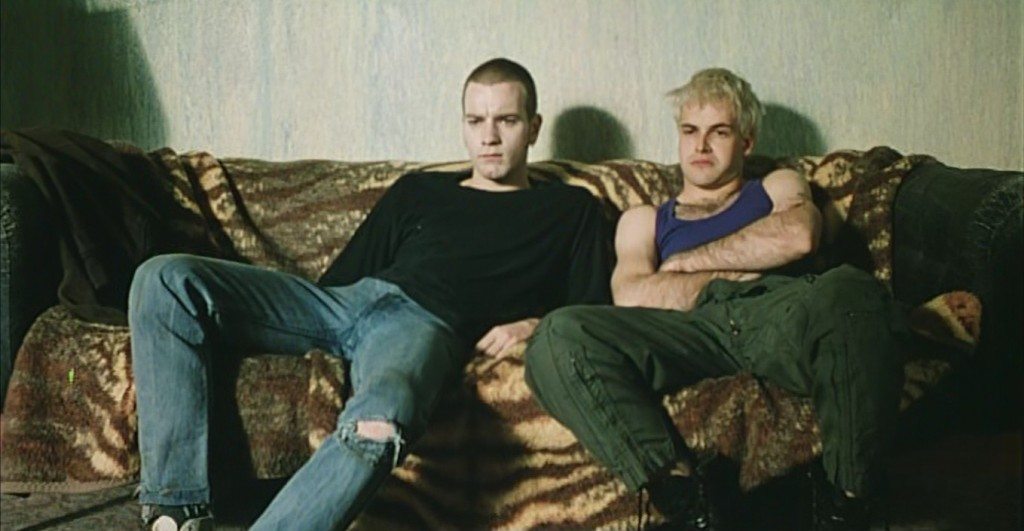
Based on Irvine Welsh’s novel, ‘Trainspotting’ follows the story of a group of heroin addicts in an economically depressed area of Edinburgh. It deals with their experiences and life while portraying drug addiction, the urban poverty and filth of Edinburgh. Directed by the ever-brilliant Danny Boyle, the film comments upon the apparently “culturally-rich” society of Edinburgh, and humours the audience with the contorted depiction of drug-addicts and junkies. While Boyle perfectly captured the society and its dark secrets, writer John Hodge deserves immense credit for his brilliant script for which he earned a nomination for the “Academy Award for Best Adapted Screenplay”. The film adopted the classic indie way filmmaking, which was quite popular during the 90s. With this, Boyle added his strong influence of punk rock and pop. This further elevated his objective of drawing a satire of the seemingly cultural depth of Edinburgh. Brian Tufano’s cinematography has been widely appreciated for its innovative style jump cuts, zoom shots, freeze frames and wide angles which added a hallucinatory and breathless pace prevalent in Boyle’s films.
Screening at the 1996 Cannes Film Festival, the film initially met with quite a number of problems. It was criticised for its subject matter, nauseated film techniques and the crass language. The emphasis on heroin and drugs prove to be too dark for the critics at the film festival. However, through its release, the film was a huge hit both critically and commercially. The aforementioned John Hodge’s screenplay was immensely appreciated, with him winning the screenplay awards at the British Academy Film Awards in 1996 and the Evening Standard British Film Awards, and also earning a nomination at the Academy Awards. Other than this, the film won “Golden Space Needle” at the 1996 Seattle International Film Festival and Ewan McGregor was named “Best Actor” from the London Film Critics Circle, BAFTA Scotland Awards and Empire magazine.
Read More: Best Hockey Movies of All Time
5. The Cook, the Thief, His Wife & Her Lover (1989)
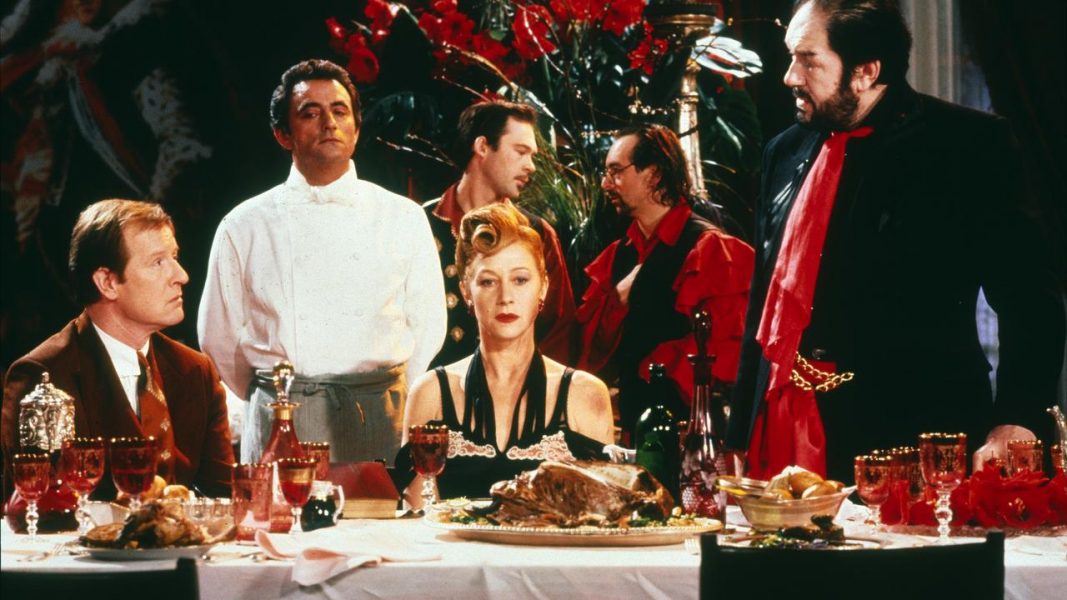
Releasing in 1989, ‘The Cook, the Thief, His Wife & Her Lover’ was a shock to critics and audience with its gritty portrayal and brazen imagery. The film is still considered a creation ahead of our time. Directed by British-French filmmaker Peter Greenaway, the movie builds its foundation on a seemingly simplistic story of a wife of an abusive English gangster and criminal, who finds solace in the arms of a kind regular guest in her husband’s restaurant. However, a masterpiece in the making, the film applies black comedy with cerebral symbolism, motifs and imagery. Drawing a parallel image between the classy and chick appearance and the grotesque mentality of the classy society; the film employed extravagant cinematography. Greenaway based his ideas on a technically sound knowledge of “Film formalism” where he paid intrinsic attention on lighting, scoring, sound and set design, use of colour, shot composition, and editing which shaped the modern era of filmmaking.
Shaped a romantic drama to the naked eye, critics were immensely enthralled with the movie’s clever adaptation of the “black comedy” genre, with Chicago Sun-Times’ Roger Ebert acknowledging it as a wind of change, saying “film’s raw emotion and violent interpersonal conflict was a departure from Greenaway’s typically cerebral and intellectual films”. The deft craft work of the director with cinematographer Sacha Vierny luminously covered the graphic scatology, violence, and nude scenes which could have easily derailed the film from achieving critical stardom.
Read More: Best Wedding Movies of All Time
4. The Seventh Seal (1957)
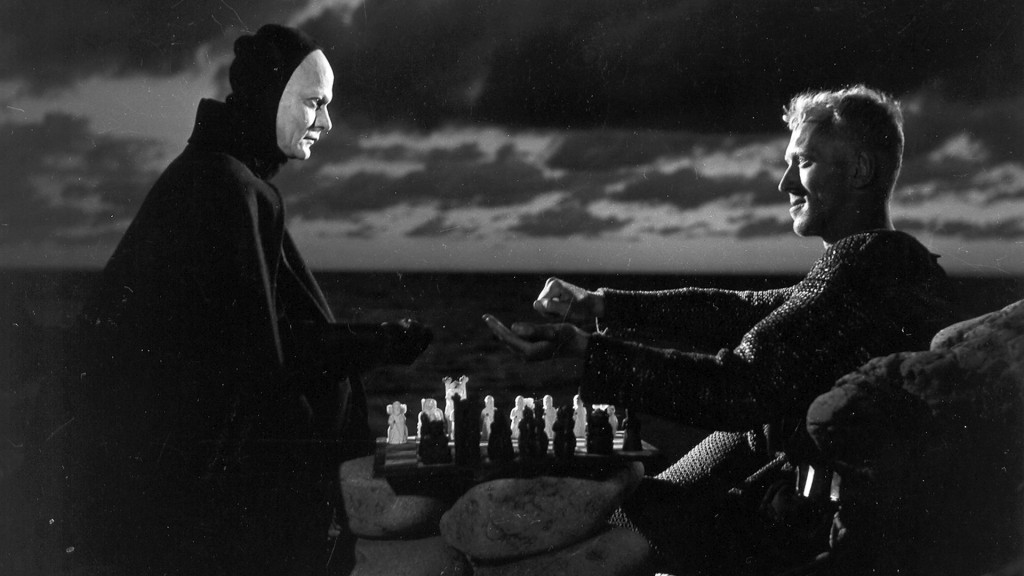
A film brimming with themes, motifs and symbols; ‘The Seventh Seal’ is often considered as one of the greatest films in World cinema. Directed by the eccentric filmmaker Ingmar Bergman, the film is about a man, who through the pursuit of seeking answers about life, death, and the existence of God, comes across death itself – the Grim Reaper, and must play a game of chess in order to attain his desire.
The film occupies the themes of Christianity and the New Testament, drawing inspiration from ‘Book of Revelation’. An art-house crafted work, the director takes the help of cultural influences to paint his ideas. Film historians Thomas W. Bohn and Richard L. Stromgren famously identified the film as beginning the director’s “cycle of films dealing with the conundrum of religious faith”. Constructing an allegorical tale embroiled in the thematic representation of Death, existence, faith and religion; the film is fantasy within imagination.
Establishing a strong foundation on the characters of Antonious Block and The Grim Reaper, the conceptual comedy writes by itself. The film is driven by Antonious Block, a knight returning from the Crusades with his faith in humanity and God brutally ruptured. He is characterised as a serious man, an idealist is looking for questions to understand the senseless slaughter of war. On the other hand, Death is solemnly dressed, speaking in a darkly unsettling measured way. Death wryly challenges Block every time he asks questions about God or the meaning of life. He tricks him into revealing his chess strategy, and continually boasts his command which would ultimately win him the game. The film established Ingmar Bergman as a top-notch director, and is considered as an artistic masterpiece.
Read More: Best Gymnastics Movies of All Time
3. Pulp Fiction (1994)
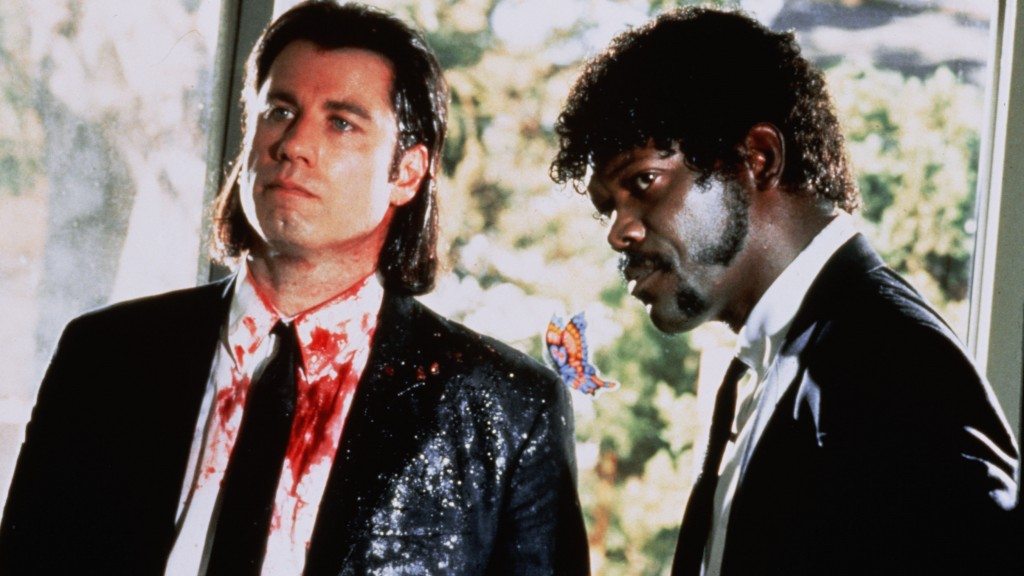
With the film’s stomach churning violence, over-the-top bloodshed and grotesque imagery; it’s quite hard to see as to where does the comedy really apply? However, that is what makes Quentin Tarantino such as eccentric director. A brilliant creator of artistic visuals, the director seems to have mastered the art of black comedy with ‘Pulp Fiction’. Incepted by Tarantino and Roger Avary, ‘Pulp Fiction’ chronicles the story of some criminals in Los Angeles, and how they come across each other on one fateful day. Paying homage to the popular adrenaline rushing pulp magazines and hardboiled crime novels of mid-20th century, the film established the foundation on crisp, mortally degrading and punchy dialogues, which sketches out the outlaying dark humour.
Tarantino is no stranger to presenting comical scenes in seemingly serious circumstances. The art here lies in the aforementioned dialogue delivery. The film aimed at drawing the innate morality and innocence of even the most heinous criminals. Starring an ensemble cast of John Travolta, Samuel L. Jackson, Uma Thurman, Harvey Keitel, Tim Roth, Amanda Plummer, Maria de Medeiros, Ving Rhames, Eric Stoltz, Rosanna Arquette, Christopher Walken and Bruce Willis; the director quite wisely chose his star-cast. With Jackson, Roth, Willis and Wlaken often praised for their contorted vision of comedy, things had to be comically violent and messy.
‘Pulp Fiction’ is the archetypical product of Tarantino. The film pays an intensive focus on human conversations and the sudden loss of interest of human psychologically. Throughout the film, the characters engage in a sudden chat, which has often nothing to do with the problematic situation. Whether discussing about the quality of coffee while disposing off a body, or appreciating a burger just before a shooting massacre; ‘Pulp Fiction’ is unsettlingly comical.
The film’s stinging combination of humour and eye-popping violence earned it a mass following, with many calling it as Tarantino’s cinematic masterpiece. The film’s celebrated screenplay and narrative structure swept the art of filmmaking; breathing new life in independent and parallel cinema and re-inventing postmodern literature.
The artistic genius of ‘Pulp Fiction’ earned it quite a many accolades. Samuel L. Jackson and duo Quentin Tarantino and Roger Avary won the Best Supporting Actor and Best Original Screenplay respectively at the Oscar’s, the Palme d’Or for Tarantino at the Cannes Film Festival and 3 awards at the National Society of Film Critics. It has also been inducted in a variety of lists, with AFI’s “100 Years…100 Movies” and preservation in the United States National Film Registry being the most prestigious.
Read More: Best Bank Robbery Movies of All Time
2. Fargo (1996)

Directed by the black-comedy veterans Coen brothers, Joel and Ethan Coen; ‘Fargo’ portrays the story of a pregnant Minnesota police chief, played by Frances McDormand, who is investigating the link between a mysterious kidnapping and a series of grotesque roadside murders. Embroiling the crime thriller with comedy, the directors perfectly bring the comical contrast between the case and its dealers. While the murders and kidnapping showcase the grim reality of the alarmingly vaulting crime, the primary protagonists show an unsettling politeness in their demeanour.
The directing duo crafts the shady comedy by employing a variety of themes, allegories, motifs and satire to adroitly sketch out the contrast. With Minnesota as the base location, the Coen brothers exploit the concepts of “Minnesota nice”, which a stereotypical behaviour of being annoyingly courteous, reserved and mild-mannered. They also employ the “family-oriented” lifestyle followed by Minnesota as to comically present a parallel storyline while reflecting it on the murders. Adding to the film’s stinging humour, ‘Fargo’ uses the wintery backdrop to depict the degrading dead bodies and the extremely “polite” investigation conducted by the officers. The directors deftly pay intrinsic focus on the crimes committed, with an initial declaimer claiming the “story is based on real events”, despite of the movie being pure fiction with several innuendoes to 1986 murder of Helle Crafts of Connecticut and the case of T. Eugene Thompson, a St. Paul attorney convicted of hiring a man to murder his wife in 1963. The film’s strength is not in its characters, but how the creators exploited the geographical locations, human tendencies and mannerisms.
Premiering at the 1996 Cannes Film Festival, ‘Fargo’ stars Frances McDormand as the pregnant Minnesota police chief, William H. Macy as the notoriously mysterious salesman, Steve Buscemi and Peter Stormare as the two criminals and Harve Presnell as the fether-in-law. Upon its release, the film was widely praised for the witty dark humour; and many even termed as one of the best films ever made. Gene Siskel and Roger Ebert named ‘Fargo’ the best film of 1996. It was inducted in American Film Institute’s “100 Years…100 Movies” and “00 Years…100 Laughs”. Among its many accolades, the film won “Prix de la mise en scène” (Best Director Award) at the 1996 Cannes Film Festival. McDormand won the “Best Actress Oscar”, and the Coens won the “Best Original Screenplay”. The iconic success of the masterpiece, as said by National Film Registry was “culturally, historically, or aesthetically significant” and has established itself as one of the best works of all time.
Read More: Best Baseball Movies of All Time
1. Dr. Strangelove (1964)

It requires some sorcery for a director to create humour. Stanley Kubrick is a sorcerer. A political satire – black comedy film commenting on the Cold War which bears of a nuclear conflict between the Soviet Union and the United States, the movie dazzlingly observes the Cold War ideology.
Military strategist and former physicist Herman Kahn in his book, ‘On Thermonuclear War’ (1960) spoke about Kubrick’s exploitation of the “Missile gap” theory which was termed by the World War II’S Supreme Allied Commander in Europe Dwight D. Eisenhower. Kubrick sharply articulated the doomsday machine to illustrate the theory of Mutual assured destruction which is a military strategy and national security policy where two or more military sides are allowed to use nuclear weapons which would cause the complete annihilation of both the attacker and the defender. The director artistically drew a parallel between military strategies and the hideous outcomes of war. The director fashioned out quirky characters which transformed the seriousness of the matter into a comic situation. The trio of Stanley Kubrick, Terry Southern and Peter George creatively adapted Peter George’s thriller novel ‘Red Alert’ (1958), and with actors Peter Sellers, George C. Scott, Sterling Hayden, Keenan Wynn and Slim Pickens, and brought out a masterpiece.
‘Dr. Strangelove’ was a milestone and transformed the genre of black comedy and satire. It went on win a number of accolades, with a rank of 3 on AFI’s “100 Years…100 Laughs”, the “American comedy award” from the Writers Guil d of America, a “Hugo Award for Best Dramatic Presentation”, the “Grand Prix of the Belgian Film Critics Association, the New York Film Critics Circle and the Italian National Syndicate of Film Journalists. Adding to this, the film was among the first group of films to be inducted for preservation in the National Film Registry.
Read More: Best Basketball Movies of All Time

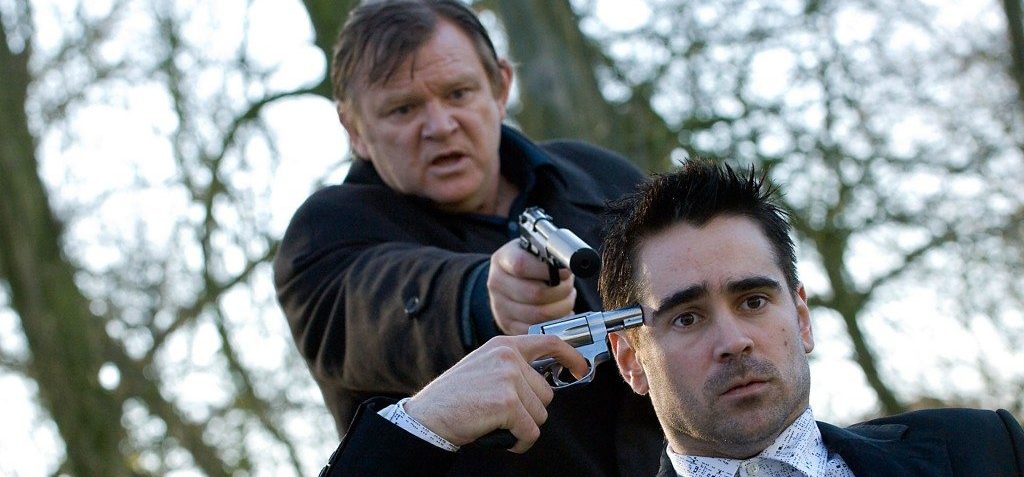
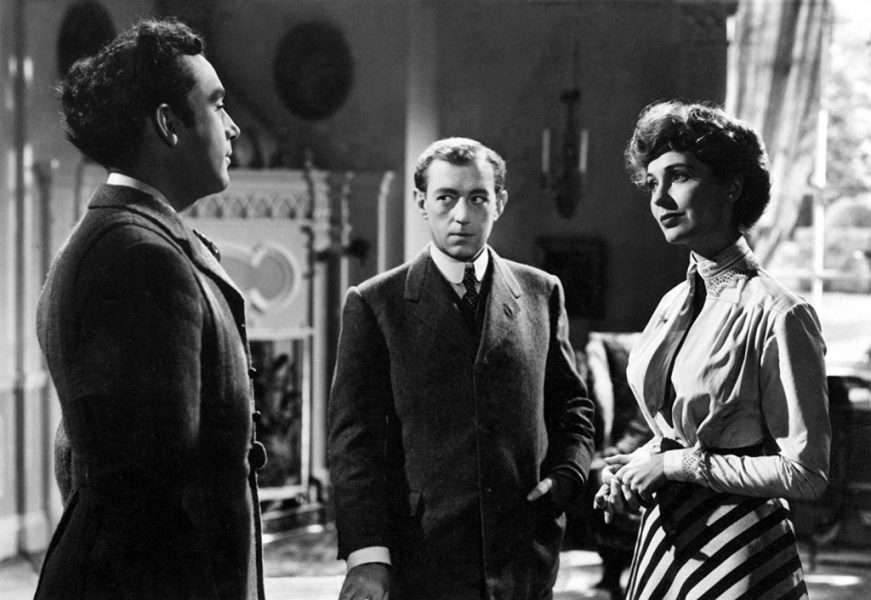
You must be logged in to post a comment.